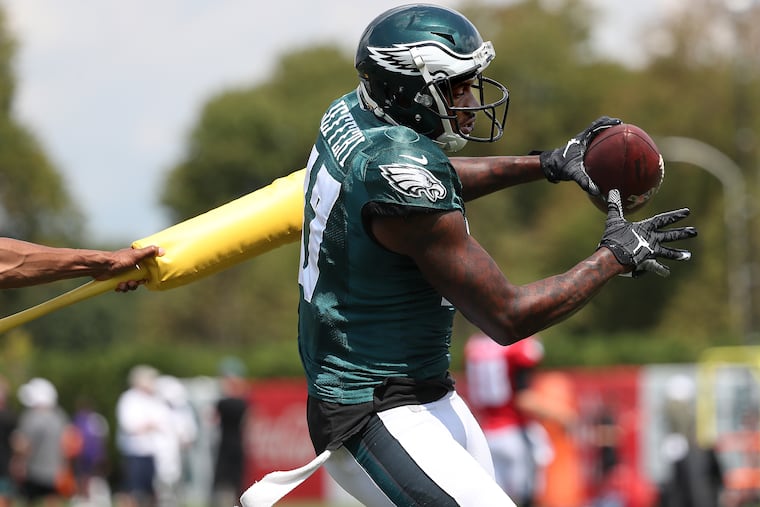The Eagles’ Alshon Jeffery is living with a big mistake. Mitch Williams understands. | Mike Sielski
No one better understands the aftermath of making a big mistake in Philadelphia than the man who allowed Joe Carter’s home run.

Alshon Jeffery doesn’t like to go back there, to the Superdome in January, to the moment that people sometimes have brought up over these last seven months. It is clear that he would rather they not bring it up, no matter how gingerly they might approach the topic. He dropped a pass late in a playoff game, the ball caroming off his hands and into the belly of Saints cornerback Marshon Lattimore for an interception. The Eagles lost. Their season had ended. He acknowledged his foul-up after the game. That’s all in the past. Enough.
“It don’t matter,” he said at the NovaCare Complex the other day. “Last year is last year.”
It’s the easiest answer, the one that buries the questions immediately, the one anyone who knows anything about Jeffery would expect him to give -- not because of how easy the answer is, but because of who he is. He has always spoken with a soft-voiced directness, whether he was guaranteeing that the Eagles would beat the Patriots in Super Bowl LII or he was putting the blame for that Saints loss on himself: “I let my teammates down, the city of Philadelphia. That’s on me. I’ll take that.”
In those 15 words, Jeffery managed to mitigate any blowback and criticism following the drop. It was a masterful example of how a pro athlete who plays for a Philadelphia franchise ought to handle a crushing mistake in an important game. You stand up. You own it. You let everyone see that it’s killing you. Yet there was an ironic twist to that day that went unseen: Hundreds of miles away, the man who threw the most infamous pitch in Phillies history, a former athlete who could empathize with Jeffery’s moment of failure, watched the end of that Eagles-Saints game and never drew a connection between Jeffery and himself.
“Not at all,” Mitch Williams said over the phone Tuesday afternoon. “I don’t think anyone would blame Alshon Jeffery.”
Williams wasn’t afforded the same measure of grace after Game 6 of the 1993 World Series, after his weary left arm delivered that down-and-in fastball that Joe Carter lined over the Skydome’s left-field wall. Jeffery got letters of support from second graders. Williams got death threats. Nothing could justify such stupidity, but it’s not surprising that the reaction to Carter’s home run was generally more intense than the one to Jeffery’s drop. The Eagles had won the Super Bowl the year before, and Jeffery’s contributions -- catching two touchdowns in the NFC championship game, catching another against the Patriots, playing all season through a torn rotator cuff -- had earned him the public’s respect and the benefit of the doubt.
“People in the stands who have never had a torn rotator cuff, there’s no way to explain how much pain is involved in just lifting your arms over your head,” Williams said. “When you think about when he dropped that pass, think about the catches he made in 2017.”
The ’93 Phillies were different. They were a bolt from the blue, a team whose championship window was one year and one year only. And after Williams and the rest of the bullpen couldn’t hold that seven-run lead in Game 4, after he couldn’t get Carter to ground into a game-ending double play in Game 6, there was a palpable sense that the Phillies had missed the last opportunity to win a World Series that they’d have for a long time. Which turned out to be exactly right. Williams never pitched for the Phillies again; they traded him to the Astros two months later.
“I was probably the guy in that locker room who was best built to handle something like that because I treated every game I pitched in like it was the seventh game of the World Series anyway,” he said. “I don’t care if it was a scrimmage game, a spring training game, regular season. They all meant the exact same to me. The only difference was that I had to wait four months before I had an opportunity to pitch again. And that’s what Alshon’s going to have to face, and I’m sure he can’t wait to make the first catch of 2019 and get it behind him.”
Of course, the flip side of Williams’ Game 7 mind-set was that many people around here already looked at sports the same way -- and still do. This is a city where fans want the athletes to display their frustration and pain and joy, to want it and feel it just like they do. Jeffery met that emotive standard by lying prone on the Superdome turf for several minutes after dropping that pass. Williams met it by answering every halting question, accepting every interview request, after throwing that pitch. They were despondent. They were genuine. They felt it. And everyone knew it.
“I never hid from the media, no matter what,” Williams said. “I was a wrestler when I was young, and the one thing wrestling taught me was you’re on an island, and you have to be accountable for what you do. … On a baseball field or on a football field in that situation, like Alshon was in, your mistake stands out.”
Williams still lives with the aftermath of his mistake: “If I had gotten Joe Carter out, nobody would know who I am.” Jeffery is doing all he can not to. Last year is last year. Time to move on. It’s the easy thing to say, the right approach to take, but just the same, it will probably feel good for him, in a moment that matters, to put his hands on the football again, cradle it close, and truly let the past go.